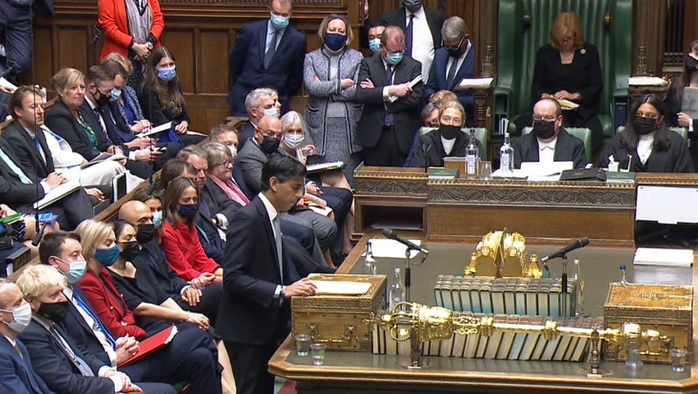Rishi Sunak said his autumn 2021 Budget was designed to set out plans for a “stronger economy”, paving the way for higher wages, a workforce with increased skills and greater productivity levels.
He said it was a simple choice: “To abandon our fiscal anchor and leave our economy adrift with reckless unfunded pledges, or to vote for what we on this side of the House know is the right course – sound public finances and a stronger economy for the British people.”
The Chancellor said the UK’s economy was forecast to return to its pre-Covid levels at the turn of the year, far earlier than had been forecast back in March.
But he also confirmed that inflation, which hit 3.1% in September – its highest level in many months – was ‘likely to rise further’ as a result of pressure on energy prices, and supply chain issues.
So, what have the business community made of it all, at first glance?
Greater Birmingham Chambers of Commerce welcomed positive moves on business rates, some measures to encourage investment and a cut in costs on sectors impacted by Covid, infrastructure spend and skills.
But Henrietta Brealey, the GBCC’s chief executive, said the fundamental reform business rates needed in the long term and the Integrated Rail Plan, including certainty on HS2 phase 2b, were notable by their absence.
She added: “All in all it is a decent budget for businesses but worth noting that corporation tax and NI increases still remain on the horizon
“With a stronger than expected economic recovery, the Chancellor was able to introduce a number of favourable tax cuts that will ultimately help those businesses that are still struggling with the effects of the pandemic.
“For a number of years, the GBCC has called for reform of the outdated business rates system and it was pleasing to see the Chancellor announce more frequent valuations, incentives to encourage green investment and a freezing of the multiplier.
“It was also good to see that business rates would be slashed for those operating in the hospitality, retail and leisure sectors – a development that will no doubt be cheered by those businesses that suffered huge losses as a result on enforced closures during the crisis.
“The extension of the AGOSS (Automated Ground Operations Scheduling System) scheme is also a sensible step and will offer a timely boost to anchor institutions such as Birmingham Airport that have been rocked to their core over the last 18 months.
“The freezing of alcohol duty will also help those in the hospitality sector. However, we would urge the Government to go further and maintain an open mind on keeping lower levels of VAT in place for the long term given the positive impact it’s had on driving consumer demand.
“The additional investment in skills training is also welcomed – for years, economic output in our region has been hindered by skills gaps and greater levels of investment will help bridge the gap between ourselves and more prosperous parts of the country.
“Greater investment in local transport networks is also something that’s long overdue. However, it was disappointing that the release of the IRP has been delayed again – if the Government’s much vaunted Levelling Up Agenda is to be realised then we need to see transformative projects such as HS2 and the Midlands Rail Hub delivered in full.
“Nevertheless, much of the Chancellor’s strategy has been predicated on a sustained economic recovery and as Mr Sunak admitted himself, the spectre of higher Covid case rates and a sharp rise in inflation could still cause huge problems for businesses during the winter.
“In light of this, we would urge the Treasury to commit to an appropriate level of financial support if national restrictions are re-introduced otherwise a number of businesses could be left facing a bleak future.”
Haulage groups welcomed news that the vehicle excise duty rates for heavy goods vehicles will be frozen, and the HGV levy will be extended until at least 2023.
Paul Madeley (pictured above), managing director of Madeleys Chartered Surveyors, said: “It is fine for the Government to allocate £1.8bn to build 160,000 new homes on brownfield sites, but this does not address the issue in rural areas like Shropshire.
“Although there is limited brownfield land in Shropshire, young professionals can’t afford to stay in the villages they’ve grown up in because there’s no smaller houses or houses for first-time buyers. It is something of a chicken and egg situation as there is little in the way of infrastructure because there is nobody to use it. More houses means more demand for schools and shops.
“Rural areas need small developments to keep young people in their communities and keep these communities going.”
Ross Northall, tax partner at BDO LLP in the Midlands said: “The Chancellor shared OBR expectations that the UK’s economy will recover more quickly, with a forecast for the economy to return to its pre-Covid level at the turn of the year - earlier than they thought in the spring statement. As a result, this Budget included several spending announcements.
“However, there are many businesses in sectors and regions disproportionately impacted in the past 20 months that are not expecting their own recovery until further ahead of that date. Our most recent Rethinking the Economy survey found that 35% of companies in the region predict it will take up to another 12 months to return to pre-Covid-19 revenues, so targeted support is still needed to deliver a sustainable and more “levelled-up” recovery.
“There were some positive announcements around skills and talent with investment, which will be welcome news for many businesses struggling with skills shortages and finding that this is the greatest barrier to growth. But, accessibility will be key to the success of the “skills revolution”. This includes ensuring 16–19-year-olds from all backgrounds and regions are able to access the opportunities and that businesses of all sizes and from all regions are then able to easily access this talent pool."
The Chancellor’s plans unveiled today – many of which had been signalled in advance – included a £5.9 billion boost for the NHS to tackle the backlog of people waiting for tests and scans.
The National Living Wage will rise next April from £8.91 to £9.50 per hour, and the public sector pay freeze will be lifted, meaning pay rises for nurses, teachers and members of the armed forces.
Mr Sunak said wages across the country were rising, and are now on average 3.5% higher than in February last year.

England's city regions are to receive a share of £6.9bn to spend on rail, bus and cycle projects in their areas – although there is some doubt over how much ofc this is ‘new money’
The Chancellor has also pledged £1.8 billion to build "greener homes" on derelict or unused land.
For the education sector, there will be £1.6 billion over three years to roll out new T-levels, with a further £550 million to be invested in adult skills.
Borrowing as a percentage of UK GDP is forecast to fall every year, and unemployment – which had been feared could rise as high as 12% due to Covid – is now expected to peak at a much lower 5.2%.
Nick Latimer, tax partner at Crowe, said: "I am pleased the Chancellor did not raise the top rate of Capital Gains Tax from 20%, which have been the subject of much speculation. There is a need to look at whether capital gains tax rates incentivise the taxpayer appropriately, but maintaining a low rate for entrepreneurial activity and a lifetime of work encourages new businesses to set up and thrive.
"The differential rate of capital gains tax for residential property (up to 28%) has not significantly, in my experience, stopped investors from backing the housing market to continue to perform, particularly with further announced government backed support and investment in affordable housing and earmarked brown-field land for new homes."
Karan Sejpal, Head of entrepreneurs, business owners and UK regions at Cazenove Capital, said: "Rishi Sunak sent a clear signal today that business owners are at the heart of driving the UK’s growth and our economic recovery from Covid-19. The central focus on encouraging inward investment into business start-ups UK-wide will be encouraging for our country’s entrepreneurs, in particular those outside of London."
Mr Sunak's final rabbit out of the hat was an 8% cut to the Universal Credit taper rate. He said: “The Universal Credit taper withdraws support as people work more hours. The rate is currently 63%, so for every extra £1 someone earns, their Universal Credit is reduced by 63p."
Mr Sunak said now was not the time to remove tax breaks on investment, saying the £1 million Annual Investment Allowance would not now end in December as had originally been proposed.
Andrew Megson, executive chairman of My Pension Expert said “Given the volatility experienced by savers throughout 2021, the Government was right not to introduce any major pension policy changes. So too was promising offering greater protections for workplace pension savers from higher scheme charges. However, the pension system is far from fixed – nearly 2.1 million UK pensioners are currently living in pension poverty. Mr Sunak can’t afford to be complacent."
Chris Romans, Head of Tax at EY in the Midlands, said: “In a Budget that was light on tax incentives for capital investment, there was some welcome news in the form of a further temporary increase in the limit of the annual investment allowance (AIA) from £200,000 to £1,000,000 for qualifying expenditure on plant and machinery incurred during the period from 1 January 2022 to 31 March 2023. The AIA, a 100% capital allowance for qualifying expenditure on plant and machinery up to a specified annual limit, has been a feature of the UK legislation since 2016. Its predecessors were nicknamed the yo-yo tax relief, as Chancellors were renowned for increasing and decreasing it to stimulate investment."
Jon Leedham, Managing Partner for Midlands at Cushman & Wakefield, said: "The 50% cut in business rates for retail and hospitality businesses, albeit only for 2022 -2023, will be a welcome boost for those qualifying retailers and the leisure and the hospitality businesses across the region who were adversely impacted by the pandemic and attempting to recover.
"Replacing the Business Rates system and starting afresh is not however, on the cards. Reforms are preferred to make the existing system fairer with the only hint of an Online Sales Tax in that Government is to consult on how this might, if introduced, be used to fund business rate reductions. This will disappoint a good many who were looking for a system which more fairly levels up the playing field between bricks and mortar, and online operators.”
Stella Amiss, Head of Tax for Regions at PwC, added: “The good news is that the Chancellor reiterated his ongoing commitment to levelling up across the whole of the UK. The deployment of the first £1.7bn of the levelling up fund to communities far and wide will be welcomed by those local initiatives, the focus on local infrastructure is always well received, and announcing the first Freeport sites in Humber, Teeside and Thames is a positive first step to delivering real change in those areas.
“However this may be regarded as a missed opportunity for a real renewed focus on developing skills and opportunities in those areas that feel left behind. A wider concerted policy to incentivise investment, skills and employment in those areas could have worked well alongside the R&D credit reform and the ambitions for the UK to become a science superpower.”
Second event of its kind
Firm eyes £200m turnover
Law firm supports deal
